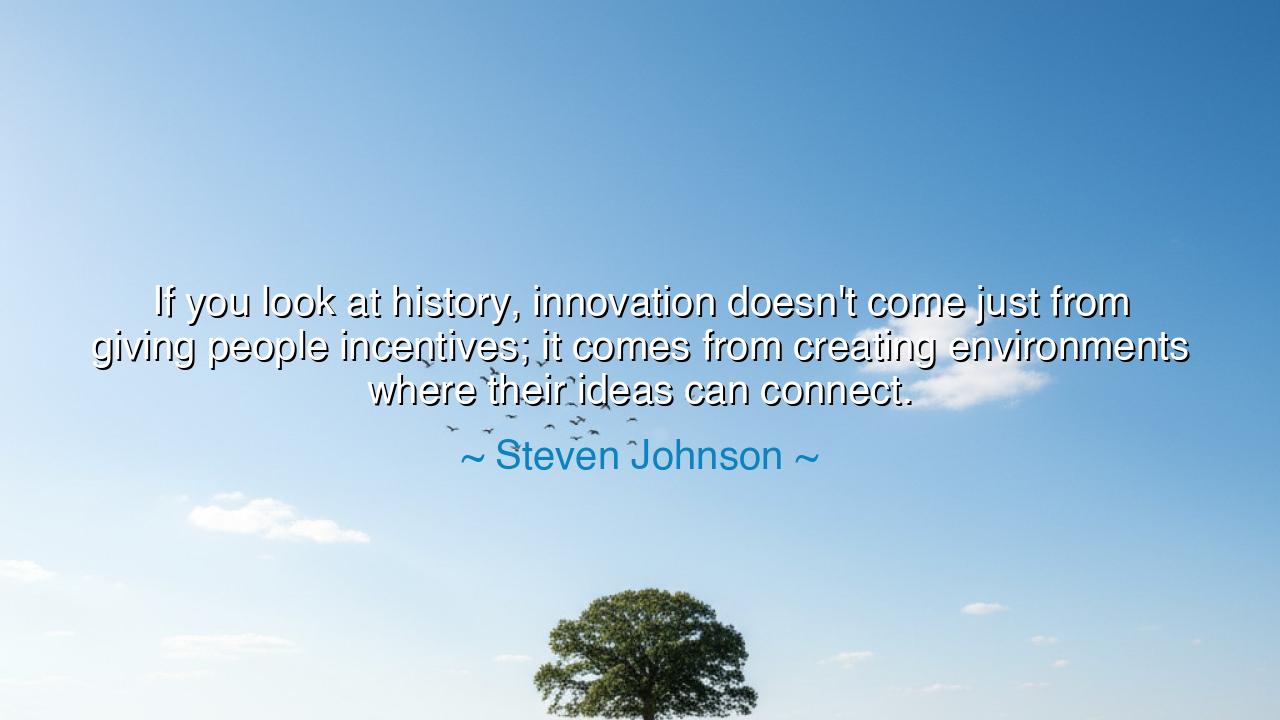
If you look at history, innovation doesn't come just from giving
If you look at history, innovation doesn't come just from giving people incentives; it comes from creating environments where their ideas can connect.






“If you look at history, innovation doesn't come just from giving people incentives; it comes from creating environments where their ideas can connect.” – Steven Johnson
Thus spoke Steven Johnson, the chronicler of ideas, who has gazed deep into the flow of history to uncover the secret patterns of innovation. In this profound saying, he reminds us that human genius does not bloom in isolation nor grow merely through reward. Gold may buy effort, but it cannot purchase inspiration. The true birthplace of innovation lies in the environment — in the living network where minds and ideas encounter one another, merge, clash, and evolve. For invention is not the spark of a single flame, but the meeting of many fires that kindle each other into brilliance.
To say that innovation comes not from incentives but from connection is to understand the very nature of creativity. A lone thinker may have a thought, but without the echo of other minds, that thought remains a whisper in the void. Throughout history, progress has always arisen where people gathered — in cities, in workshops, in coffeehouses and universities — places where the exchange of ideas was free and alive. The environment, not the individual alone, is the engine of transformation. The soil must be rich before the seed can grow. Thus, the wise ruler, the enlightened teacher, or the visionary leader does not merely command his people to invent; he builds the world in which invention can flourish.
Consider, for example, the flowering of Renaissance Florence. It was not born of royal decree or of promise of reward, but of a culture woven with curiosity, discussion, and competition of minds. Artists, scientists, philosophers, and patrons met beneath the same sun. Leonardo da Vinci, Michelangelo, and Galileo did not create in solitude, but within an ecosystem of thought that valued experimentation, beauty, and discovery. The Medici family did not simply give gold — they gave patronage, space, and freedom, crafting an environment where the imagination of one could inspire the genius of another. Their city became a crucible of innovation, not because men were bribed to think, but because they were invited to dream together.
Or look to a more modern age — the rise of Silicon Valley, the heart of the digital revolution. Its triumph was not merely the result of wealth, but of collaboration. Engineers, dreamers, and tinkerers gathered there, drawn by curiosity rather than greed. They shared ideas in garages, universities, and labs — ideas that built upon one another like stones in a mighty bridge. When Steve Jobs and Steve Wozniak built the first Apple computer, they did so surrounded by a culture of open experimentation, not confined by bureaucracy or fear of failure. It was this environment of connection, not the lure of riches, that gave birth to the age of technology. Incentives alone could not have created the Internet, the smartphone, or the modern world. It was the communion of ideas that did.
Steven Johnson’s insight pierces to the heart of a deeper truth — that innovation is collective memory reborn. The greatest ideas are not new creations ex nihilo, but new combinations of ancient thoughts. The mind, when left alone, grows narrow; but when it meets others, it expands like a river meeting the sea. Thus, history shows that progress is not a straight path walked by lone heroes, but a web of connections woven across time and place. Each generation inherits the dreams of the last and transforms them anew. To create the future, we must build environments that allow ideas to mingle as freely as the winds.
And yet, Johnson’s words are also a warning. In our age, where competition often replaces collaboration, and isolation hides behind screens, we risk forgetting this law of creation. When we silence dialogue, when we hoard knowledge, when we divide rather than unite, the flow of innovation falters. A world obsessed with reward produces effort without imagination. But a world alive with connection, with shared purpose and open curiosity, produces miracles. The challenge of our time is not to build higher walls of ambition, but wider bridges of thought.
So, O seeker of wisdom, learn this from the ages: if you would kindle greatness, create environments where ideas can connect. Seek out others who think differently, for in difference lies discovery. Build communities, not cages; conversations, not contests. Let your mind touch other minds, and your dream merge with theirs. For innovation is not the song of a single voice — it is the symphony of many. As Steven Johnson teaches, the history of humanity’s progress is the history of connection. Where minds meet, the future is born. And those who nurture such meeting places do more than change the world — they give it the power to keep creating itself, again and again, through the endless turning of time.






AAdministratorAdministrator
Welcome, honored guests. Please leave a comment, we will respond soon